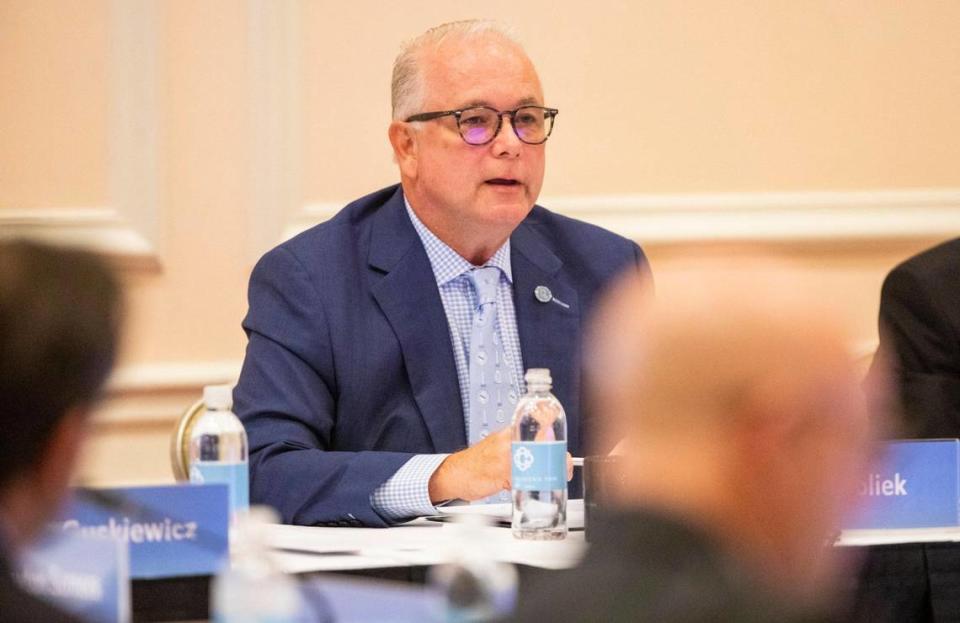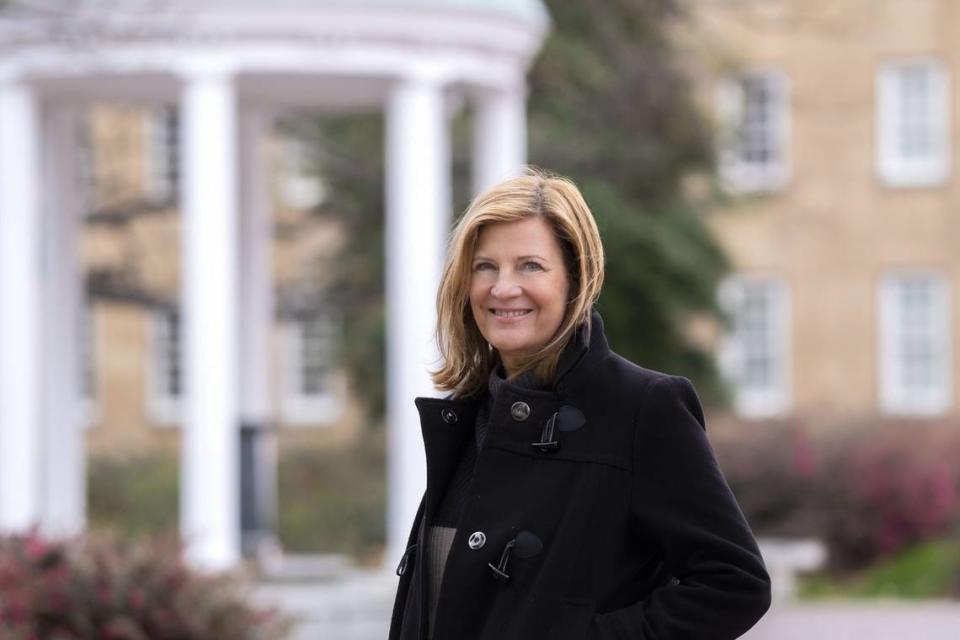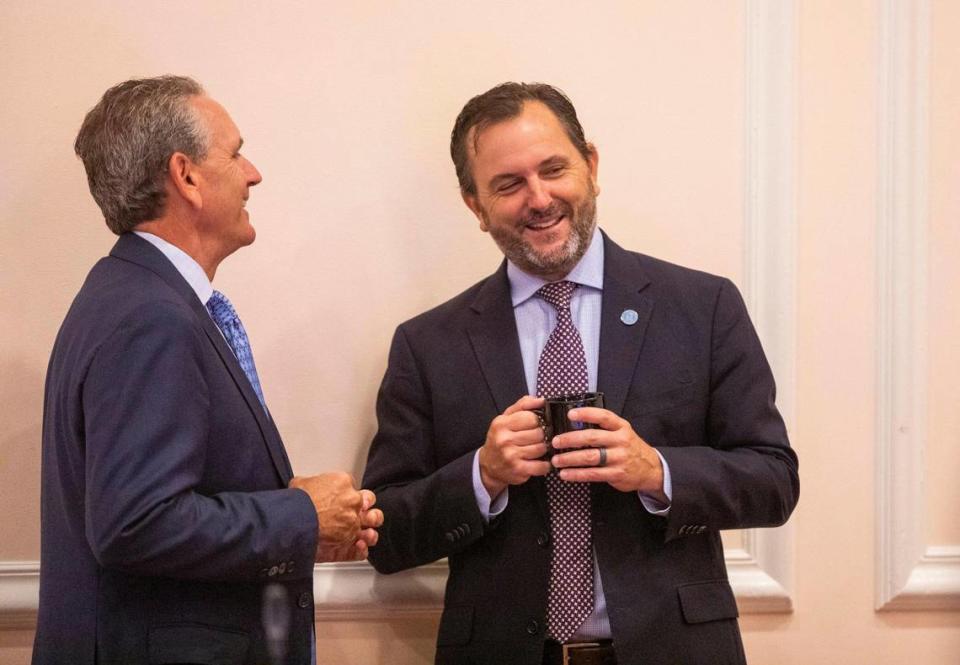Why have UNC faculty and employee reps been excluded from recent trustee meetings?
The leaders representing groups of UNC-Chapel Hill professors, employees and graduate students have not been invited to speak on behalf of their colleagues to the campus Board of Trustees since new leaders of the board took over in the the summer.
It is customary in the past for the faculty chair, Employee Forum chair and president of the Graduate and Professional Student Government to give remarks at board meetings, typically in the University Affairs Committee meeting. At least one of those representatives, and usually all three, spoke at every board meeting over the past year thought May.
But since that May meeting, none of them have been invited to speak, they say.
“It is unacceptable that we have not yet been invited to speak to the board as key stakeholders for the three primary constituencies of this university (staff, faculty, and students),” Employee Forum Chair Katie Musgrove said in an email to The News & Observer.
She and Neel Swamy, president of Graduate and Professional Student Government, began their terms this year and have not had an opportunity to introduce themselves or make remarks to the board yet.

Not included because of ‘a full agenda’
Faculty Chair Mimi Chapman said they were told that the agenda for the July meeting was too crowded, so they wouldn’t be invited.
“To say that they don’t have time for the people that work on this campus — that’s bizarre,” Chapman said, noting that their remarks typically run about two minutes.
It’s also another example of things feeling very out of whack now in terms of the way things have traditionally worked, Chapman said.
For this week’s Board of Trustees meeting, the “three people that represent everyone who works on this campus” weren’t given a reason for being excluded, she said.

After the trustees meeting Thursday, Chair Dave Boliek said there was no particular reason behind the three not speaking ”other than just we have a full agenda.” He said they’re looking forward to hearing from all stakeholders over the next few meetings.
Trustee Rob Bryan, a former Republican state senator, is the chair of the University Affairs committee and helps sets the agenda.
Bryan said he didn’t know the precedent as a new board member and that the chair is trying to work on a process of who to have in and when. Bryan said he’d also like to see the board add ways to communicate with faculty outside of meetings so they have more time to process the information being shared, he said.
After Thursday’s meeting, UNC-CH Chancellor Kevin Guskiewicz said he believes faculty, staff and student voices need to be heard and the board is working on a plan to include them.
‘It does feel pointed’
The last time Chapman spoke at a trustees meeting was in May, when UNC-CH was grappling with national criticism around the tenure case of journalist Nikole Hannah-Jones.
At the May meeting, Chapman said the board’s decision to override a faculty recommendation regarding tenure damaged the relationship with the university faculty, The News & Observer previously reported. Chapman said the decision shows that trustees do not value faculty members’ expertise, judgment or devotion to the university, which is “devastating and demoralizing.”
“When we recommend tenure, we do so with a deep conviction that the person being tenured has ideas and work that are life changing and life affirming, even if that work and those ideas are controversial or difficult to sit with,” Chapman said at the time.
“For me, I would choose to be your partner, and not your adversary,” she said. “But partnership requires respect, and at this moment, the faculty is not feeling that.”

Chapman is an outspoken faculty leader who has publicly criticized university decisions, including regarding the COVID-19 pandemic, Hannah-Jones’s tenure and the handling of the former Silent Sam Confederate monument on campus. The night before the last board meeting, she called an emergency faculty meeting over concerns that state politicians, campus trustees and BOG members wanted to replace Guskiewicz.
She has brought up issues with the board in faculty meetings, in a letter published in The Daily Tar Heel and most recently as a founding member of the Coalition for Carolina. That group of UNC-CH stakeholders want to take political influences out of campus decisions.
“It does feel pointed,” Chapman said, given her remarks at the May meeting.
Chapman said she was told the trustees don’t want to be lectured, which she doesn’t think she’s done, “but I suppose that’s how they interpreted it.”
Chapman, Musgrove and Swamy attended the trustees’ university affairs meeting Wednesday in solidarity with one another, given they had not been invited or communicated with administration, Musgrove said.
The move by the campus Board of Trustees, which is appointed in part by the UNC System Board of Governors, is similar to action by the BOG earlier this summer when it did not reappoint a distinguished law professor to the University of North Carolina Press Board of Governors this summer — a move that some say was politically motivated.
UNC-Chapel Hill law professor Eric Muller said he was not told why he was singled out, but suggested it could be because he’s been outspoken about matters of law, race and history within the UNC System and at the Chapel Hill campus.

 Yahoo Movies
Yahoo Movies 